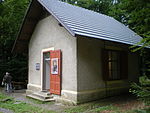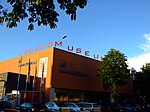The University of Klagenfurt (German: Universität Klagenfurt or Alpen-Adria-Universität Klagenfurt, AAU) is a federal Austrian research university and the largest research and higher education institution in the state of Carinthia. It has its campus in Klagenfurt.
Originally founded in 1970 and relaunched in 1993, the university today holds faculties of arts, humanities & education, management, economics & law, social sciences, and technical sciences. It is listed in the ARWU, THE, and QS global rankings and held rank 48 worldwide in THE's Young University Rankings 2021.The university has defined three research priority areas, Social Ecology (until 2018, transferred to BOKU Vienna), Networked and Autonomous Systems, and Multiple Perspectives in Optimization, with the former spawning three ERC Grants and the latter a doc.funds programme of the Austrian Science Fund. It has launched a new initiative, Humans in the Digital Age (HDA), in 2019, hosting an ERC Grant on cybersecurity.
It also holds a number of central facilities such as the Robert Musil Institute (co-organizer of the Bachmann Prize), the Karl Popper Kolleg (an Institute for Advanced Study), the University Cultural Centre (UNIKUM), the build! Gründerzentrum (a start-up facilitation center), the University Sports Centre (USI), and the Klagenfurt University Library.
Oliver Vitouch, a cognitive psychologist and former faculty member of the University of Vienna and the Max Planck Institute for Human Development in Berlin, is the university's Vice-Chancellor. Martin Hitz chairs the Academic Senate; Werner Wutscher, former Secretary General of the European Forum Alpbach, is chairman of the University Council.
The University of Klagenfurt is situated 30 km from the Slovenian and 60 km from the Italian border and supports bi- and multilingualism, especially in the context of the Slovenian minority in Carinthia. Together with the Free University of Bozen-Bolzano (Italy) and the University of Fribourg (Switzerland), it is among the three southernmost universities in the German-speaking world.








